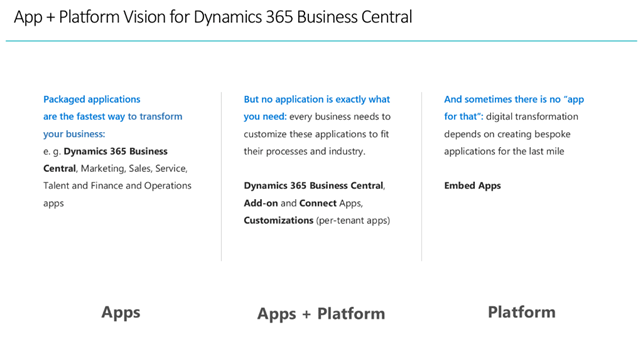Events
Power BI DataViz World Championships
Feb 14, 4 PM - Mar 31, 4 PM
With 4 chances to enter, you could win a conference package and make it to the LIVE Grand Finale in Las Vegas
Learn moreThis browser is no longer supported.
Upgrade to Microsoft Edge to take advantage of the latest features, security updates, and technical support.
Embed App is a term that defines an end-to-end solution meeting the specific needs of a vertical or micro-vertical industry.
Dynamics 365 Business Central plays a vital role in the Embed App, as Business Central is embedded as an integral part of the overall solution.
Some examples of an Embed App include:
An Embed App refers to what is being provided to a given customer segment, unrelated to how the solution is being implemented or architected. An Embed App can be built using AL, in other words extension, code-customization, and a combination of extensions and code-customization.

On a high level, an Embed App is a package that consists of the following parts:
Library extensions
This is the functionality of the Embed App that is implemented by the ISV partner in a form of extensions.
Third party extensions
These are add-on extensions coming from other ISVs that contribute to and enhance the Embed App. The extensions are validated to be compatible by the Embed App owner.
Extended metadata
This includes additional Embed App properties that are specific to this type of app and not otherwise available for other types of apps (see the list below).
Base application and tenant template (optional)
The following capabilities are only available for the Embed App and not for other types of Business Central apps (Connect and Add-on).
The Embed App will promote the partner's brand in several places:
https://[application name].bc.dynamics.comhttps://[application name].api.bc.dynamics.com
The partner can control which third party apps can be installed for their Embed App.
Partners can choose to bring their own code-customized base application as an Embed App for several reasons:
Shortening time-to-market ("lift and shift" approach).
The partner's current solution is a significantly customized version of the Dynamics NAV application and it will require substantial time and effort to migrate it into extensions. A partner can lift their solution as-is (upgraded to a supported platform) to Business Central service and start offering it to their new and prospective customers. Then, they can gradually start moving their functionality into extensions to achieve the benefits that come with the extension model. The earliest version of the Business Central application you can bring to the service is version 16.
Usage of .NET interoperability and custom assemblies.
Partners that use .NET interoperability in their current application to address multiple business scenarios. Although extensions today allow a number of these scenarios to be implemented in AL, they don't and cannot cover for all possible scenarios of .NET usage. Therefore, the partner can choose to import the required .NET add-ins into the Add-ins table of the base application, and these add-ins will automatically be deployed into the environment where they will be running.
An Embed App is the property of the partner, so the customers of the Embed App must be able to find the partner's own legal, privacy, contact, community and feedback links (not Microsoft links) when they work with the app:

Safe listed domains for embedding Embed App pages into other web sites, including SharePoint ("frame ancestors")
Target version of Dynamics 365 Business Central platform
Target version of Dynamics 365 Business Central base application (if not included with the Embed App)
Azure KeyVault account for storing application secrets, such as accounts for connecting to 1-3rd party services
Base application + tenant template. This is an optional component of an Embed App. The partner can choose to include it or simply specify which version of the Dynamics 365 Business Central base application the Embed App should use as a base application.
At this stage, within the extensions and base application, the partner can work in their own Object ID range.
Microsoft is going to make new versions of the Business Central platform available to Embed App partners through the Lifecycle Services portal (LCS). The partner will then have to pick the platform they want to use for deployment of their solution.
When a partner deploys a solution through the LCS portal, they can pick from the last three available versions of the platform (minor and major). Every newly released minor or major platform update will be added to the list and simultaneously one older version will be removed form that list.
Any existing deployments, running on platform versions that are older than 3 updates, will enter a grace period of 30 days. And after that, if the deployment is not upgraded, it will be moved out of the standard SLA.
Microsoft Responsibilities
Qualification and Onboarding
Managing in Microsoft Lifecycle Services
Components and Capabilities
Deployment of Dynamics 365 Business Central
Administration of Business Central Online
Administration of Business Central On-Premises
Events
Power BI DataViz World Championships
Feb 14, 4 PM - Mar 31, 4 PM
With 4 chances to enter, you could win a conference package and make it to the LIVE Grand Finale in Las Vegas
Learn moreTraining
Module
SharePoint Embedded - overview & configuration - Training
Learn how to perform the necessary setup and configuration steps to create apps for SharePoint Embedded.
Certification
Microsoft Certified: Dynamics 365 Business Central Developer Associate - Certifications
Demonstrate you have the skills to design, develop, test, and maintain solutions based on Dynamics 365 Business Central.
Documentation
App Management for ISVs - Business Central
The App Management API can help you manage your apps running in different customer Business Central environments.
Maintain AppSource apps and per-tenant extensions - Business Central
Learn about resources available to you as the publisher of an app or per-tenant extension for keeping your code in compliance with the base product.
Hotfix an AppSource app - Business Central
Learn how to hotfix an AppSource app in Dynamics 365 Business Central.